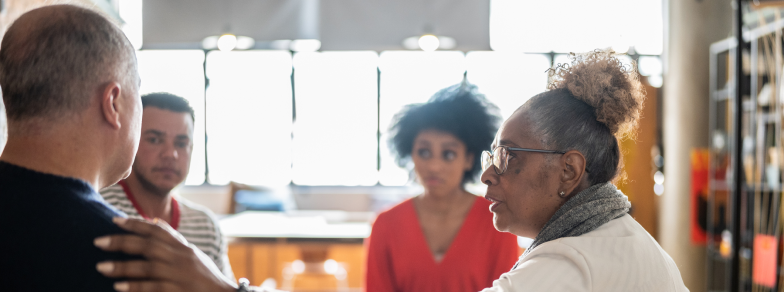
Adult Behavioral Addiction Programs
Our team is committed to providing comprehensive treatment services to assist you at every step of your recovery journey. Addiction can occur in many forms including gambling, gaming, shopping/spending or binge eating.
Day Treatment
Day treatment, also known as a partial hospitalization program, is available with or without boarding. This program offers intensive group education and therapy services during the day with the ability to stay overnight or transition to a supportive home environment in the evening.

Outpatient Services
Outpatient care, including intensive outpatient and continuing care, provides structured education and group support to maintain a program of ongoing recovery. Daytime and evening groups are available.
Programming
- Educational Groups
- Group Counseling
- Individual Counseling
- Family Programming
- Family Visiting
- Leisure and Fitness Activities
- Recovery support such as 12 step peer support and education
- Individualized Recovery and Discharge Planning
- Medical support as needed including medication-assisted treatment

Signs & Symptoms to Consider
Signs and Symptoms of Gambling Disorder:
- Preoccupation.
- Gambles increasing amounts of money to achieve the desired effect, attempts to cut back, stop or control.
- Experiences feelings of restlessness or irritability when attempting to cut down or stop.
- Gambles to escape feelings or problems.
- After losing money, will often return to chase losses.
- Dishonesty related to gambling behaviors.
- Commits illegal acts to finance gambling.
- Difficulties with relationship, jobs, or education because of gambling.
- Experiences debt as a result of gambling.
If you are concerned or have questions about gambling disorder, call (309) 691-1055 to learn more about how we can help.
*Modified from DSM-5 (Diagnostic and Statistical Manual of Mental Disorders)
Signs and Symptoms of Gaming Addiction:
- Preoccupation with gaming.
- Withdrawal symptoms when gaming is taken away or not possible. (sadness, anxiety, irritability)
- Tolerance, the need to spend more time gaming to satisfy the urge.
- Inability to reduce playing, unsuccessful attempts to quit gaming.
- Giving up other activities, loss of interest in previously enjoyed activities due to gaming.
- Continuing to game despite problems.
- Deceiving family members or others about the amount of time spent on gaming.
- The use of gaming to relieve negative moods, such as guilt or hopelessness.
- Risk, having jeopardized or lost a job or relationship due to gaming.
- If you are concerned or have questions about gaming addiction, call (309) 691-1055 to learn more about how we can help.
*Proposed criteria from section III of DSM-5
Signs and Symptoms of Shopping/Spending Addiction:
- Feeling a rush of euphoria when spending money.
- Shopping or spending money as a result of feeling depressed or anxious.
- Dishonesty related to spending habits.
- Arguments with others about one's shopping or spending habits
- If you are concerned or have questions about shopping/spending addiction, call (309) 691-1055 to learn more about how we can help.
Signs and Symptoms of Binge Eating:
- Eating much more rapidly than normal, until feeling uncomfortably full and/or eating large amounts of food when not feeling physically hungry.
- Eating alone because of being embarrassed by how much one is eating.
- Feeling disgusted with oneself, depressed, or very guilty after overeating.
- Marked distress regarding binge eating.
- Absence of compensatory behaviors (such as purging).
- If you are concerned or have questions about binge eating, call (309) 691-1055 to learn more about how we can help.
*Modified from DSM-5
Experiencing a Crisis?
For emergencies, dial 911 or go to your nearest emergency department.
For mental health and substance use crisis support and resources, contact:
Trillium Place Crisis Services, available 24/7:
Peoria County - (309) 671-8084
Tazewell & Woodford Counties - (309) 347-1148
